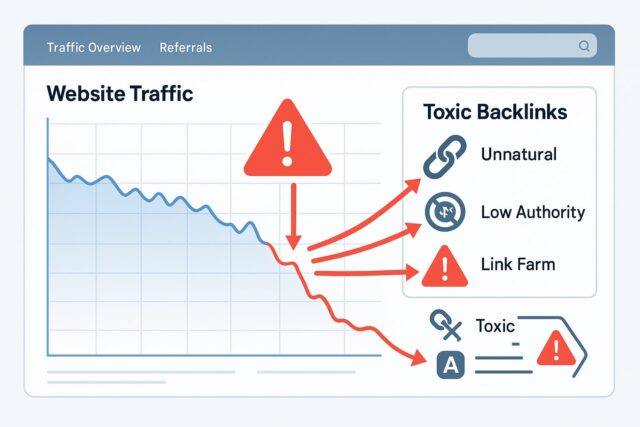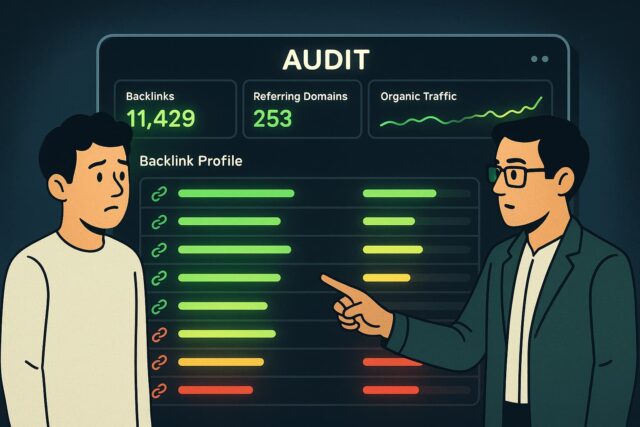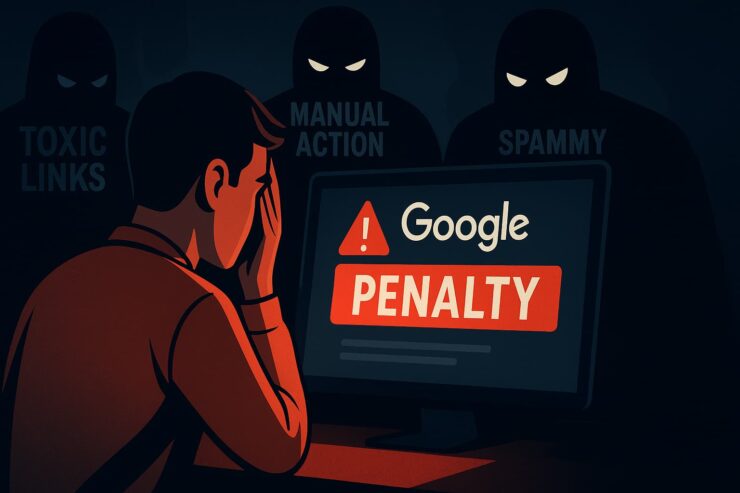Link building is a critical part of SEO, but not all links are beneficial. Poor-quality or toxic backlinks can harm your site’s rankings and even trigger penalties from search engines. A professional link building audit helps identify these issues and provides a clear path to fixing them.
Here are five signs that indicate you need a professional link-building audit service:
1. Your Organic Traffic Has Dropped Suddenly
A sudden drop in organic traffic is often a sign that something is wrong with your SEO. While it could be caused by technical issues, algorithm updates, or outdated content, toxic backlinks are a common but frequently overlooked reason.
Google’s systems are constantly on the lookout for shady link profiles. If your site has accumulated spammy or unnatural backlinks — whether from old-school SEO tactics, competitor sabotage, or just careless linking — you might be getting hit by Google’s filters (like the infamous Penguin update). The result? Your rankings tank without an obvious explanation.
Here’s how to investigate:
- Peek into Google Search Console for any penalties or security alerts.
- Check if there were recent algorithm updates affecting your niche.
- Scan your backlink history for suspicious activity.
Noticed your website traffic slipping even though you haven’t changed your design or content? Your backlinks might be the culprit. A professional backlink audit digs into every link pointing to your site, weeds out the bad ones, and gives you a clear action plan — whether that’s getting them removed or using Google’s disavow tool.
Think of it as more than just damage control — it’s about keeping your site on Google’s good side for years to come.
2. You’ve Received a Google Manual Penalty
A manual penalty in Google Search Console for “unnatural links” means someone at Google has manually checked your site and found specific backlinks that violate their guidelines. This isn’t an automated message—it’s a confirmed issue that needs to be addressed quickly.
Here’s why you need to treat this seriously:
- These penalties don’t just go away over time
- Ignoring them can lead to long-term damage to your rankings
- Google expects clear action before it will consider lifting the penalty
A professional link-building audit gives you a clear strategy for recovering from link-related penalties. It:
- Pinpoints exactly which links got you in trouble (no guessing games).
- Helps you remove the bad ones through direct outreach.
- Builds a disavow file for links that can’t be removed.
- Prepares the necessary documentation for a Google reconsideration request.
The danger of doing it alone? You might miss some toxic links (Google will reject your appeal) or accidentally disavow good ones (making your rankings worse). A proper audit gives you the exact roadmap to recovery — no trial and error needed.
Pro tip: The faster you handle this, the less long-term damage your site will suffer. Google’s memory is long when it comes to manipulative links.
3. You’ve Purchased Links or Used Black-Hat SEO Tactics in the Past

If your website utilized questionable link-building strategies years ago, such as purchasing links, participating in link schemes, or over-optimizing anchor text, such behaviors may still be harming your SEO now. Many company owners are unaware that Google’s algorithms may discover and penalize certain tendencies long after they occur.
The issue isn’t simply with outdated links. Google’s bots constantly assess your whole backlink history. Even if you quit these habits years ago, you may still experience:
- Lower rankings due to algorithmic filters;
- Risk of manual penalties if Google reviews your site;
- Reduced trust from search engines.
A comprehensive link audit examines your complete backlink profile to identify:
- Purchased or artificial links;
- Links from spammy directories or low-quality sites;
- Over-optimized anchor text patterns;
- Suspicious link spikes that look unnatural.
The solution involves:
- Identifying all problematic links;
- Removing them where possible;
- Disavowing the rest through Google’s tools;
- Building a clean, sustainable link profile moving forward.
Don’t assume past SEO mistakes no longer matter. A proper audit gives you concrete data about which links need to be addressed, helping you eliminate lingering ranking obstacles. The process isn’t just about fixing past errors — it’s about creating a stronger foundation for future growth.
If you ever used aggressive SEO tactics, your site likely needs a backlink audit. Without one, you could be leaving rankings and traffic on the table unnecessarily.
4. Your Competitors Are Outranking You Despite Similar Content
It’s frustrating when competitors consistently rank higher despite having similar — or even inferior — content. In most cases, the answer lies in their backlink profile. Google still heavily weights quality backlinks as a ranking factor, and competitors with stronger links will often maintain their advantage.
How to spot if weak backlinks are holding you back:
- Your on-page SEO checks all the boxes, but rankings don’t improve.
- Competitors show more referring domains in Ahrefs or SEMrush.
- Their backlinks come from authoritative industry sources.
A proper competitive analysis does more than clean up bad links — it reveals exactly where you’re falling short:
- Missing high-authority links that competitors have secured;
- Imbalanced anchor text that appears unnatural compared to competitors;
- Better link placements in expert roundups or research citations.
Turning insights into action:
- Focus outreach efforts on sites already linking to competitors.
- Model successful strategies like guest posts or PR placements.
- Stop wasting time on low-quality link opportunities.
For example, if you’re struggling to rank for “best CRM software” while competitors boast links from TechCrunch and Forbes, those are clear targets for your own link-building efforts. A detailed audit gives you this competitive intelligence, showing exactly which links will move the needle for your rankings.
The takeaway? When content quality isn’t the differentiator, backlinks usually are. Identifying and closing these gaps should be a priority in your SEO strategy.
5. You’ve Never Conducted a Backlink Audit Before
Most websites collect backlinks over time without ever checking their quality. If you’ve never analyzed your link profile, there’s a good chance it includes some problematic links — particularly if your site has been around for a while. Even if your rankings seem fine today, bad backlinks could be slowly damaging your SEO without you realizing it.
A professional backlink audit acts like a check-up for your site’s link health. It shows you which links are helping your rankings and which ones might be hurting them. Without this insight, you risk unexpected ranking losses or even Google penalties. The audit gives you a clear plan to clean up bad links and focus on building better ones moving forward.
How a Professional Link Building Audit Works

A thorough link-building audit involves:
- Scanning your entire backlink profile;
- Identifying toxic or suspicious links;
- Analyzing anchor text distribution;
- Comparing your links with competitors’;
- Recommending high-quality link-building opportunities.
3XE Digital is one company that delivers this type of comprehensive analysis. Their team performs in-depth backlink audits to identify problematic links while providing clear solutions to fix them. The service includes personally contacting websites to remove bad links, preparing proper disavow files, and suggesting effective strategies for building quality links going forward. What makes them different is their manual review process — rather than relying solely on software, their experts carefully evaluate how each link affects your site’s performance. This hands-on method gives you more accurate insights than automated tools alone.
Final Thoughts
Ignoring your backlink profile might result in ranking drops, penalties, and lost visitors. If any of the above issues apply to your website, a professional link audit is an excellent next step. By finding and eliminating problematic links while also discovering new opportunities, you may enhance your site’s SEO foundation and boost long-term performance.


Published by